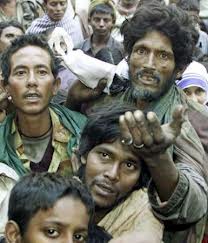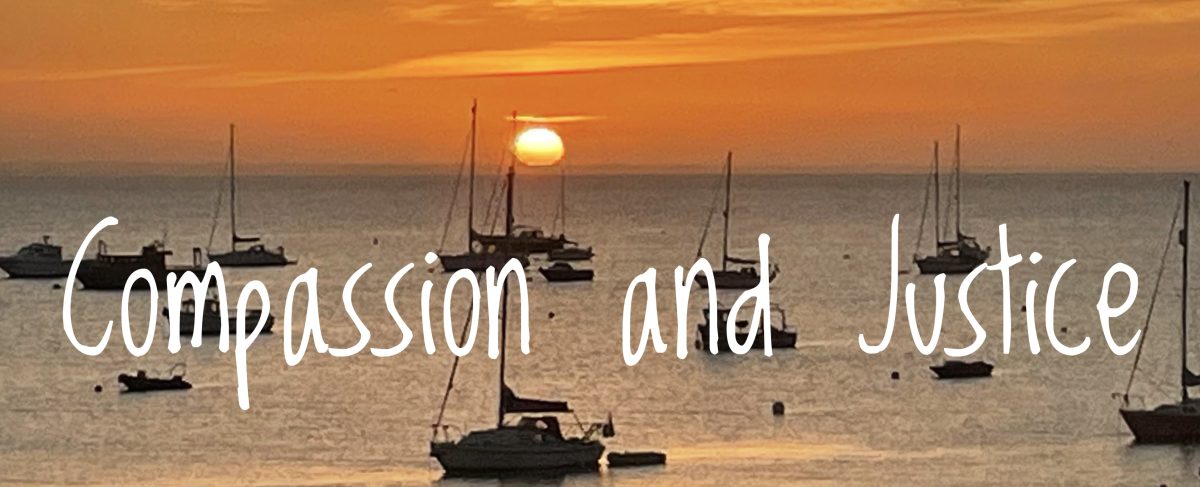
Dependency has become a bad word in the charity business. Fighting poverty is good, but meeting the needs of people in poverty can produce dependency, which is not regarded as a good thing.
But before we “throw the baby out with the bathwater”, consider our children. A newborn baby is completely helpless and completely dependent on its parents. We do not say to the parents,” Do not feed your child: you may produce dependency”. In this case, dependency is good and it’s natural.
At the other end of the scale, if a poverty relief programme simply gives out to needy families, who could actually take charge of their lives to meet those needs themselves, then that program is producing a dependency. At best this programme will be inefficient and at worst it can actually do more harm than good to the recipients.
Begging
Consider the giving of alms to beggars on the street in a country such as India. This practice actually encourages more beggars as begging becomes a viable economic activity. In this situation, although charity may meet an immediate need, it can do more harm than good. In reality, giving to beggars is more about making the giver feel good than caring for the real needs of the person before them.
However things are not quite that simple. If a man, for mental or physical reasons, cannot produce income in any other possible way, and there is nobody else who can help, then begging may be the only alternative to starvation and death. This man is already “dependent” on others, whether we like it or not.
A simple rule
If a charitable programme continues to meet the same needs of the same people year after year, and if the recipients of the programme could actually meet those needs themselves with initiative or with a little guidance, then that programme is producing dependency and is inefficient, or at worst is actually harmful to the recipients.
Transfer of resources
At best, a program producing dependency, is simply a transfer of resources (usually money) from the rich to poor. There are people whose income is up to 1,000,000 times that of a person living in extreme poverty. If that money can be transferred, either by taxation or voluntary giving, from the rich and poor, then this must be a good thing. But it needs to be done wisely, not encouraging dependency.
Investment
If we are to fight against poverty, and injustice, we need to produce charitable programs which either:
- Help people, trapped by extreme poverty, to find a way out of that poverty.
- Campaign against injustice and apathy which produce poverty.
It is the difference between spending money and investing money. Simply relieving poverty is like spending, fighting poverty is an investment for the future of not only poor people, but the future of society as a whole.
I am avoiding a dogmatic statement such as, “a program producing dependency is always a bad thing and can actually harm the recipients of the program”. In practice a programme can produce some good benefits, be neutral, be inefficient or it can be harmful.
Consider these Situations
Consider the following situations, and make a judgement as to whether the programme produces dependency and if so whether that dependency is good, neutral or harmful.
- A government scheme producing a monthly allowance for severely disabled people who find it difficult to earn money themselves.
- A programme which helps people with restricted sight to find meaningful employment.
- A programme which runs a health clinic in a remote area sponsored by an international charity.
- A charity dedicated towards helping people to get out of debt by giving advice and by negotiating with the creditors.
- An international charity helping to meet the running costs of an orphanage in a developing country. Consider the fact that the children are by nature dependent. Also consider whether or not these needs could be met by the government, or the society of that country.
- A programme which disperses food packages weekly to families living in a slum around a major city in a developing country.
- A programme which saves lives by distributing food supplements in an area hit by a sudden famine, earthquake or flood.
- A programme which gives grants of a cow to a poor family as an income generation scheme helping the family to produce an income. We need to consider what happens if the cow dies and what happens when a calf is produced. Does the family consider the cows belong to them, or to the charity which gave the cow?
My personal experience is that most people are very generous and genuinely want to help when they see a need. But in the same way that government agencies and charities need wisdom in combating poverty, we as givers need wisdom in how and where to give.
No charity has a perfect record. We have all made mistakes. The charity I am associated with, Karuna Action, is trying hard to learn the lessons and seeks to support programmes which are sustainable and do not encourage harmful dependency.
What do you think?
I would really like to know what you think. You may agree with me, or disagree with me. please let me have your comments by:
- Emailing me at george@karunaaction.org.
- Leave a comment below. Unless you have a WordPress user-name you will need to leave your email address, but this is NOT PUBLIC and you can either give your name or remain anonymous.
Related articles
- Extreme Wealth and Extreme Poverty (georgedowdell.org)

Hi would you mind letting me know which web host you’re using? I’ve loaded your blog in 3 completely different internet browsers and I must say this blog loads
a lot faster then most. Can you suggest a good internet hosting provider at
a honest price? Cheers, I appreciate it!
LikeLike
Hi Barney
The blog is hosted by http://www.wordpress.com and the basic package is free. The basic package comes with lots of facilities but you can pay a bit extra for some extras. In my case I pay about $100 a year for the ability do some extra customising. WordPress is excellent for a blog but can be used to set up a commercial web site.
George
LikeLike
Dear, George
Although these mails do not need reply,I must thank you and encourage to continue with this work for it refreshes the souls of the weak and strong.
Am just down hear on the mountains of the moon Kasese district Uganda and a founder member of a registered Cbo Allied front 4rural improvement & community advancement (africa) raising efforts to save humanity throughEarly child hood development(ECD) andcommunity development.
Please any effort on the same towards any of these programs is highly welcome and keep the spirit of friendship alive.
Joel
________________________________
LikeLike
A most frequent situation is when more than one organization like Karuna Action decide to help. Then there are at times when helping turns into “constant birthday party”. Recipients receive multiple gifts from donors who don’t ask & Charities who don’t tell, “what’s the situation now?” “are we still needed?”. When Charities talk to one another and KNOW that each other are involved, and dialog with one another with grace and humility, that is proven to help prevent unintentional Over helping. Collaborative Networks and multi-lateral Partnerships are essential to the work of the Church Helping all over the world. Haiti is an interesting case study for many questions of Over helping. There are 10,000 Charities who serve in Haiti. That’s literally 1 charity for every 900 people who live in Haiti! Are all these Charities rain clouds offering irrigation where it’s needed, or are they preventing needed sunshine?? Just as the ground needs seasons, and Winter is when roots grow deeper, People as often need freedom TO struggle as much as they need Freedom from pain and struggle. Scripture suggests we tempter our Zeal with Wisdom.
There’s helping. Then there’s over helping. Over helping without due-diligence/assessment/reflection and revision, runs the risk of creating “forever-children.” Over helping usually comes when the HELPER is places their own “need to help” as a higher priority than truly assessing the need of the recipient of the help. If I tie my child’s shoe for her every day, will she ever do it herself? It depends on the child. Most children protest! “I can do it myself!”…. some children will take the help for as long as it’s available to them…they become conditioned to receiving services from others. Some children have no hands, and they will need someone to tie their shoes their entire lives. Some children have no feet, and therefore no need for shoes – but wheelchairs….and on it goes. Godly HELPING comes from DUE DILIGENCE, Hearted Prayer, and Wisdom. John V. Taylor said, “The day is coming when we will be, as a majority, the Church OF the Poor, not the Church TO the Poor”…the Church OF the Poor may be the Strength of God and surprise us all! We are no less commissioned to “go therefore and make disciples of all nations…”
LikeLike
Thank you Helen for your well thought out comments.
LikeLike
This is a good way of gaining wisdom from how other people view sensitive areas of giving and love of their neighbour.
By using God’s word for guidance, and Jesus’ example of giving, We should give until we start to get little nagging thoughs: is it wise to give all this, wont I be going short?
I dont recall anywhrere in there word that commands us to “hold back, just in case”.
If a dependency is unavoidable, what ever form that may take, disabled beggars, orphanages, then so be it, there are obvious need that require being met.
But, if there is a dependency simpley because there are free give-aways to be had, when the crisis has passed, when the recipient can sustain them self, it’s a matter for their own concience.
In my oppinion, each govt is responsible for each and every one of the poeple that are subject to their rule. But we are not in a world that floats on love , kindness, and self sacrificing. Not to mention fair distribution of needed resourses, that’s why there is a taxation system. Rather we’re livng in a world that’s suspended on greed, selfishness, fear, (of missing out/ going without). Corruption seems to rule in the most repectable and respected governmants all over the planet. They are all, without exception self seeking glory hunting hypocrites. (rant over).
Personnaly speaking, I expect no charity, whether large, small, international or domestic, to opperate without flaws, the fact that Karuna is putting in effort to iron out its wrinkles is commendable. But those that seek to serve Jesus know that grace is always with them, and that God’s store house is limetless. You know He with cause us to fret here and there, with deadlines coming up fast, emergency aid suddenly needed, but He’s a good Father, and with all of our best interests in mind, will allow us to wait til the eleventh hour for the fruit of prayer and action is at hand. Good faith building exersize that !!!
I also think that a total to world poverty is a dream, Jesus said “you will always have the poor”, but that doesn’t mean we should stop trying to see that dream a reality. Maybe not in our life time, but who knows what could happen. Remember this little gem: the effective, fervent prayer of a righteous man avails much.”?
What about the prayes of 100 such men?
Signing off. God bless and loads of love. xx
LikeLike